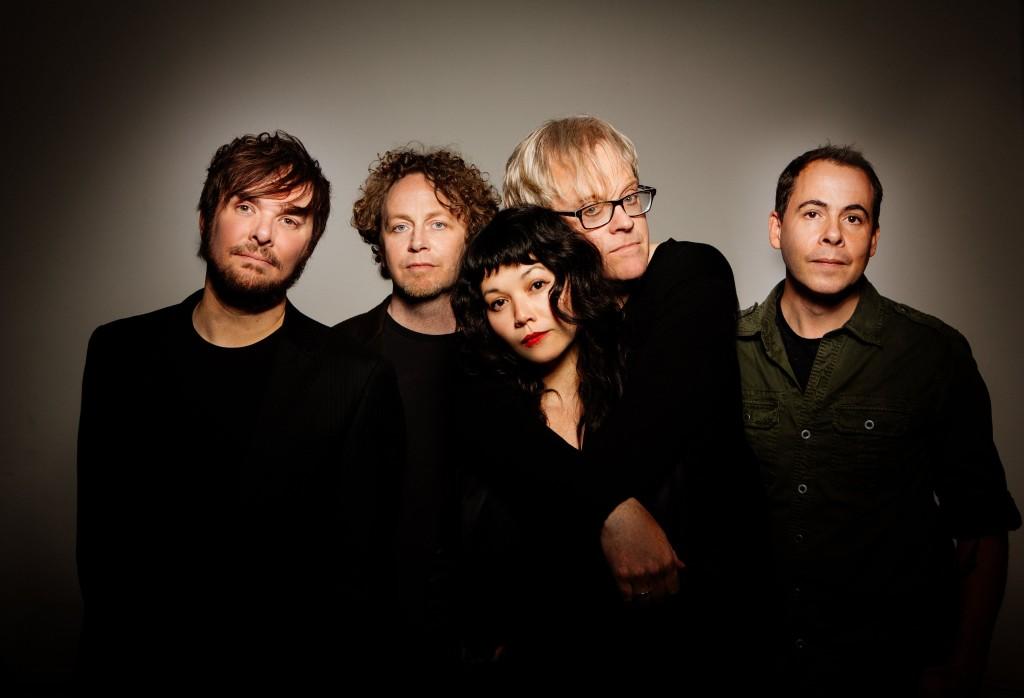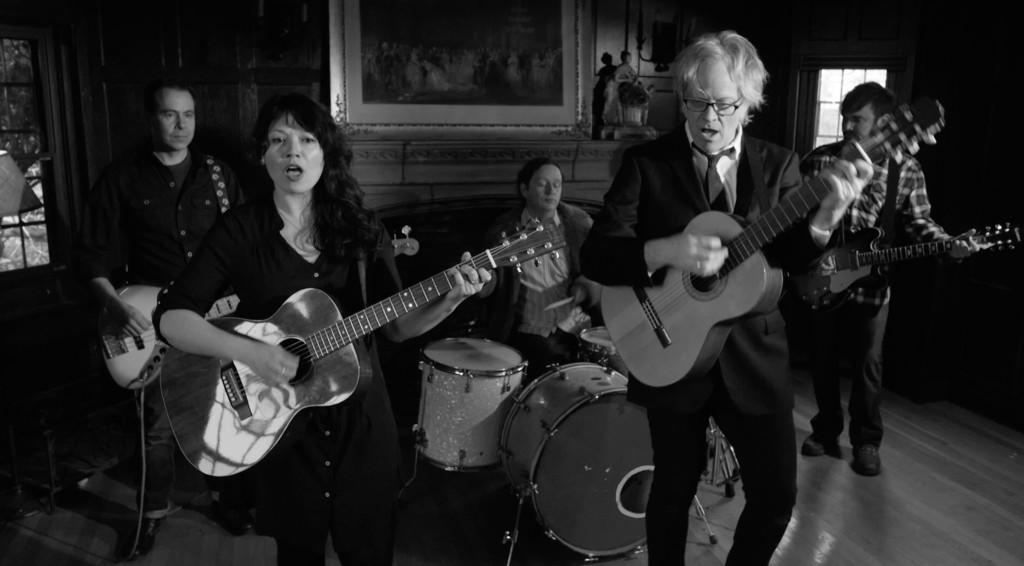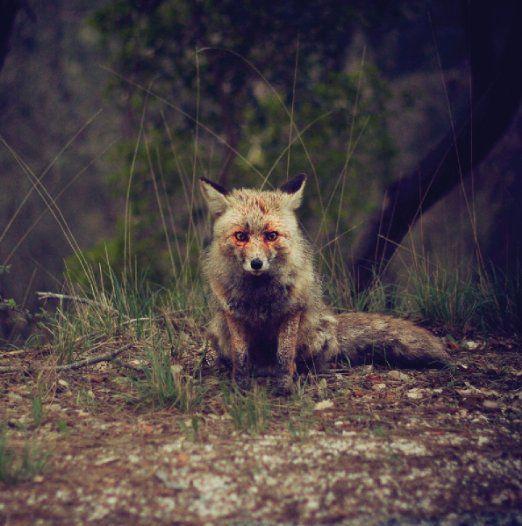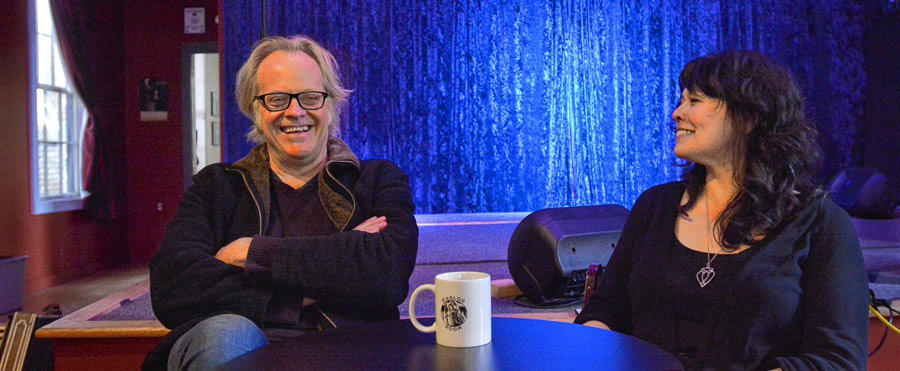Winterpills songs bloom like flowers at night. The Northampton indie rock band leads with clear, bright melodies, but the backdrop is often cast in shadow, marked by swelling strings, sighing harmonicas, and spare piano keys glinting oddly in the dark. Since 2005, the chamber pop quintet has crafted ballads that sound homegrown, fragile, and full of color. In short: these are great local love songs.
The band nicknamed its seventh album Love Songs as a tongue-in-cheek reference to “the other million albums of the same title,” says singer and lead songwriter Philip Price, “but then casting that light on the existing songs made them jump into stark relief: they were all love songs after all, though arriving at that place through strange portals and unused back roads.”
The name stuck, and on March 18 Winterpills released Love Songs on Signature Sounds, working for the first time with Justin Pizzoferrato (Pixies, Lou Barlow, Speedy Ortiz). For Price and co-lead singer Flora Reed — whose marriage grew out of playing together in this band — this release isn’t just a good lead-in to two live shows at the Parlor Room in Northampton this week. It’s the newest living keepsake from a band that saved them both, after brief solo careers, from never having met.
The Advocate met with Price and Reed at the Parlor Room to talk love, Love Songs, and lessons from a decade of making music together.
Philip Price: When we started off, our trademark sound was very quiet. This was in 2005 — the late Elliott Smith era of indie music, where they said that “quiet was the new loud.” After playing in [local power pop band] The Maggies for nine years and yelling my lyrics, being quiet felt more true. But then you play a lot of shows in rock clubs, where people can’t really hear you, and you start to rock again. Before we knew it, we were a rock band again, but we also had this deeper sonic palette to draw from.
Flora Reed: I heard somebody say that Winterpills performs quiet songs loudly. I like that. I think on this record, working with Justin, we were able to sonically push things further than we could at our home studio. But you still want to keep a feeling of intimacy with the listener, so we had to figure out a way to do that.
What was that journey like, putting this album together with Justin?
FR: Well, Echolalia, the album from 2014, was all covers. So it had been since 2012 that we’d recorded original songs.
PP: We knew it was time for a new album. I’d written about 25 songs to choose from. The band [Price, Reed, guitarist Dennis Crommet, bassist Max Germer, and drummer Dave Hower] went through them, and the ones that stuck out we took into the studio. It was very freeing. Justin has worked with [Dinosaur Jr.’s] J Mascis, Sonic Youth, other art-rock groups. So it was okay for us to get really loud in there, but he’s also great with acoustic stuff.
We recorded pretty much everything live — all the basic tracks are done with all of us playing together and looking at each other. That’s not how we did it for the past few albums, because our studio was just a little room upstairs in our house. There were cables everywhere, running to microphones in different rooms. Dave’s drums were set up in the foyer upstairs, to connect everyone. So, when we were tracking drums, no one could leave their rooms. Someone needs to use the bathroom? Forget it — you’ve got to wait 40 minutes until we finish with Dave and move the drums out of the way.
What were some your creative discoveries in Justin’s studio?
PP: I remember really feeling it with the song “Chapel.” Working with him encouraged us to get bigger with it and add new layers to it. We recorded a lot on it, and then we peeled it back and he mixed it. That song’s a great example.
FR: He was always asking us: do you want to try this amp? This pedal? To see what it does?
PP: He has so many different toys, and he knows how to use them. I’m usually just stuck with the same guitar and the same amp I’ve been recording with forever. It was exciting to have so many choices, and someone there who could guide us.
FR: I got to play the e-bow. I’ve never played that before. You just hold it over the guitar string, and the magnet makes the string resonate.
PP: It’s like holding a handful of Robert Fripp.
Do you each have favorite songs on this album?
PP: Often when we’re done with a record, there’s a lot of obsessive listening to the mixes, it gets mastered — and then three years goes by and you never listen to it. But even though this album is done, I still find myself listening to it. I have a crush on this record.
“Freeze Your Light” was the song we’ve been playing for a while that just felt gem-like to all of us — we really liked the arrangement.
FR: “Freeze Your Light” is a favorite for me. But then “Incunabula” I really like. Philip wrote it quickly during the last week or two of studio time. Before that, we were having a challenging time figuring out a track listing that felt right. But we put “Incunabula” first, and everything clicked.
PP: That song was the glue — everything else flowed from that. The word means “incubating state,” like a sort of pre-birth. I stumbled across it in the dictionary. Which fits, since the song sounds like we all just woke up and started recording it.
It does have a sort of groggy romance to it.
PP: I remember I was sick when I recorded it. I wanted to do it another ten times, but Justin just said: great, we’re done! So I’m glad it works.
FR: “Celia Johnson,” the first single, you also wrote later.
PP: Yeah, that was a late addition as well. We needed a power pop song and a spacey acoustic song, for balance.
A decade ago, people were predicting the death of the album — they thought everything was going to be singles. But people still like albums. If you’re a listener, an appreciator, a fan, it’s great to get a curated collection of songs by an artist. There’s something human-scale about it.
We did cut one song we really liked. It was one too many big, dramatic rock numbers. We recorded it, and Dave the drummer was listening to a mix, and he’s like: you can’t put this guitar there, because this is an R&B song. I said, are you serious? I wrote an R&B song? We’ll release that one at some point.
Flora told me that the new song “He Grew A Wall” is about a suicide that shook the local music scene. Do other songs on this album have such specific points of origin?
PP: No, they come from a lot of different places. Not to be vague about it. I just don’t know what the hell I’m doing most of the time. Sometimes I don’t think people understand how much fakery goes into making authentic art.
I think of songwriting like visual art. That’s what I did in college — painting and print-making — and I learned from some of my painting teachers what it takes to put songs together. I use the same thinking, in terms of applying and deconstructing and painting over.
Flora, were you involved in the arts from a young age too?
FR: I started playing guitar in high school, and I always sang with choruses. I wrote songs in high school and college. When I moved here after St. Mary’s [College of Maryland], I just knew I wanted to work in the music business somehow.
I picked up my job at Signature Sounds while I worked for Dar Williams’ manager. I put out a solo record in 2002, but I didn’t have the greatest time trying to tour on my own. It gets lonely.
PP: I also had a solo career for two years, after the break-up of The Maggies. I put out two albums and tried to tour, but I had a bad time. I didn’t know how to be a guy with an acoustic guitar. It was lonely and strange. I didn’t have confidence. I asked Dennis and Dave to accompany me on a couple shows, and that’s when we started calling ourselves Winterpills. Then Flora began singing with us.
FR: I was the last person to join the band. I knew Philip because I was a Maggies fan. We weren’t together before I joined the band. We thought about putting the brakes on being a couple, because it might not have been the best idea.
PP: Turns out it was the best idea. We were all nervous about what the band was going to think, but no one cared.
FR: I play more guitar and keyboard than I used to. And I view our singing as a co-lead vocal. We sing together on most everything we do. And Philip’s the main songwriter.
PP: We came from different musical tastes, but we’ve always overlapped plenty.
You know, even though I adore Elliott Smith and consider myself influenced by him, I never saw him live. Flora saw him live five times. We just watched a good new documentary on him — Heaven Adores You. It really focuses on his music and creative path, and not on how druggy and suicidal he was.
Why does Elliott Smith intrigue you?
PP: I just remember when I first heard him, back in like 1997. People hadn’t heard songwriting like that in a long time, since the ’60s or ’70s, but he was doing it with the disaffected voice of younger people in the ’90s. It was couched in this super pretty, melodic, Nick Drake-ian style, but there was a lot of darkness in it. It was only pretty on the outside.
FR: His sense of melody is pretty rare, I think. Every one of his songs sounds effortless.
PP: When I heard him, I was in the middle of a power pop band, trying to make big, shiny, glistening, loud, chiming guitars with walls of distorted sound and stacked harmony vocals. That’s fun to construct, but sometimes I go back and listen to it, and it just feels kind of impenetrable to me. It doesn’t feel like there’s a lot of heart in it. That’s what Elliot Smith taught me.
Has your fan base changed very much in the past decade?
FR: We get a good mix of people coming out to shows. People of all ages — college kids and up — seem to slowly, consistently discover us.
PP: I’ve always thought of us as a slow-growing vine, or maybe moss. We’re bigger than we were ten years ago, but only by a little each year. We’re just making our way up the side of the building.
We did a tour with the band Cake. They have two fan bases: the people who were there from the beginning, and the people who joined up after the [1996 hit single] “The Distance.” One group is small and solid, and the other is this enormous mishmash of frat boys. Cake has to play to both audiences, because both of them always show up. We’ve never had that moment in our career. Maybe it’s forthcoming, but I’m not even sure we want that.
We’ve spanned two or three eras in the music biz over the past ten years. When we started, people still bought CDs. Nowadays they don’t buy many CDs — they’re buying more vinyl. But really, they’re not buying much of anything. A lot of younger bands are going back to cassettes, because they’re so cheap to manufacture. It’s this craving for a physical product that still exists, even with all the streaming services.
Do you like how the Valley music scene has changed over the past decade?
PP: Well, the Calvin sign is still broken. That hasn’t changed.
I feel like there’s tons of stuff going on that I don’t know about. Which is great. There’s jangly indie pop acts like And The Kids, who are sort of beyond the Valley at this point. There’s always this hovering freak-folk scene. Then the bluegrass and Americana scene, which Signature Sounds is kind of a hub for.
FR: The Parlor Room hosts the Parlor Sessions every Sunday, which is more of an old-timey bluegrass jam — everyone brings their instruments and plays. A lot of young people come to that. And there’s more of a house concert scene than there used to be. Transperformance raises money for arts in schools. People are doing good things. The Bookmill … Luthier’s …
PP: Flywheel … One Bar is now going to become something new — I have high hopes for that. It feels pretty robust here. When you break it down, it actually seems like an embarrassment of riches. But how about some more liquor licenses and food trucks?
You both have trailed in and out of solo performing, but writing and playing for a band and each other seems to be where you feel most at home. Is that true?
PP: Yes. I’m always writing for other parts that I’m not great at playing myself. I’ve always needed another voice.
FR: I was never a prolific songwriter, so I don’t know what I would do without Winterpills. I feel like I really lucked into this. I get fun parts, and I get to sing great songs. We all have other jobs outside of music, so when we’re together as a band, it’s in this other world.
Even though you’ve both made a ten-year career out of this band, there must still be mentally or emotionally challenging aspects of making music for a living.
PP: Yes, it’s hard to make a living. I’ve thought of quitting it at different times. But damned if the songs don’t keep coming.
It’s hard to gauge success in music, because so often there’s not much in the way of money. But I’d say that if you can’t help but make it, then you have to make room to do it. That’s it.
Some interviewer asked Andy Partridge, from XTC, how he was able to keep putting out high-quality music after so many albums. He said that it really helps to not ever have a hit song.
Because you keep trying to write that hit! It’s a hard business. Just don’t be a dick about it. Be nice to everybody. I haven’t heeded that advice all the time, but I really do think it’s the truth.
And keep writing songs. Because you’re not going to get any worse.
Contact Hunter Styles at hstyles@valleyadvocate.com.






